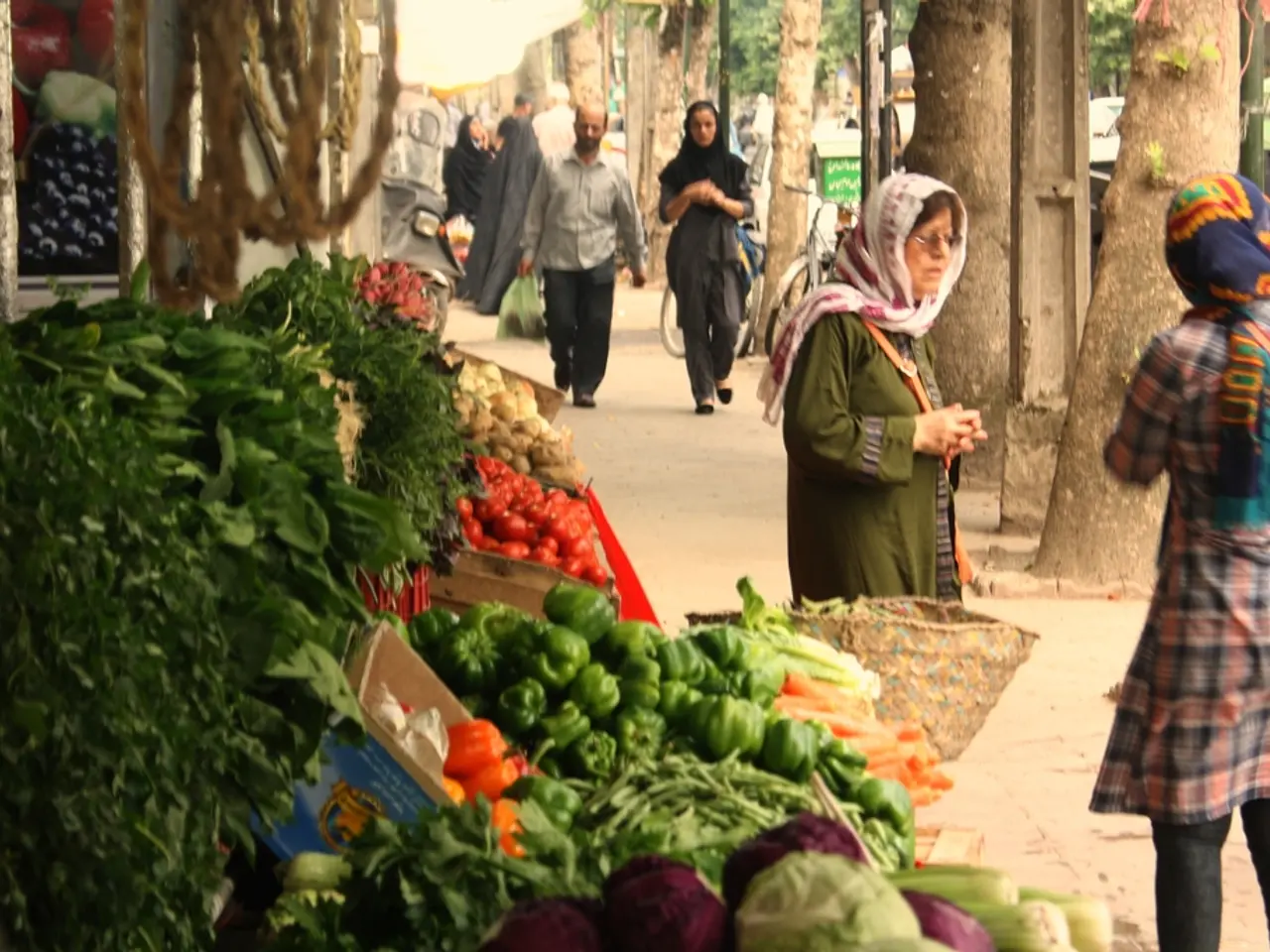Agriculture Sector Farmers Praise PM Modi and Government for Sturdy Approach to Agricultural Trade, Asserting Protection of Their Benefits
Strengthening Self-Reliance in Indian Agriculture
In a significant move to protect farmers and rural communities, the Indian government has announced a series of historic measures aimed at bolstering self-reliance in agriculture and rural sectors. These measures are designed to shield Indian farmers from volatile global markets and unfair competition, particularly from the US.
The heart of these measures lies in the government's commitment to promoting climate-resilient crops, high import tariffs, and strategic trade diversification. For instance, the Dhan-Dhaanya Krishi Yojana focuses on low-productivity districts, promoting crop diversification and climate-resilient seeds. High import tariffs, reaching up to 700%, protect domestic farmers by shielding them from subsidized foreign agricultural exports [1].
Moreover, the India-Middle East Food Corridor, a $7 billion initiative, aims to diversify trade routes and markets for Indian grains, fruits, and dairy products. This corridor, involving UAE logistics and Israeli agri-tech, is expected to create new market opportunities worth an estimated $10 billion, thereby reducing dependency on traditional export channels and boosting farmer incomes [1].
The government's support for agri-tech and digital platforms is also noteworthy. Efforts to modernize farming through agri-tech startups, e-NAM (electronic National Agriculture Market), precision agriculture, and solar irrigation technologies are attracting global investment [1].
Prime Minister Narendra Modi's political commitment to protecting farmers' interests is evident in his recent speeches. In his 2022 Independence Day speech, he reiterated India's unwavering commitment to farmers, pledging to oppose policies threatening small-scale farmers and rural livelihoods [2][5].
The government's economic strategy balances farmer protection with broader economic goals under the “Vocal for Local” campaign. While India remains firm on not opening sensitive sectors like agriculture and dairy fully, it is embracing technological advancement and selective international partnerships to ensure long-term sustainable growth without compromising food security or rural welfare [3][4].
These measures have had a positive impact on farmers and the agricultural sector. Farmers receive robust protection against global market shocks and subsidized foreign competition, helping stabilize their income and encouraging diversification towards climate-resilient crops [1]. Enhanced digital infrastructure and agri-tech adoption improve productivity and reduce input costs, fostering a more sustainable and profitable farming ecosystem [1].
Diversified export markets and trade corridors open new revenue streams for agricultural producers while strengthening regional economic ties [1]. The government's firm policy stance reassures farmers of political support, preserving rural livelihoods critical to India's economy and social fabric [2][3][4].
Union Agriculture Minister Shivraj Singh Chouhan recently announced that the government will introduce strict laws to curb the production of fake fertilisers and pesticides. Virendra Lohan of the Chhattisgarh Youth Progressive Farmers' Association welcomed the government's move to keep American companies out of India's agriculture and dairy sectors. Chouhan also praised Prime Minister Modi's 'Nation First' approach, noting the historic cancellation of the Indus Waters Treaty after the Pahalgam terror attack [6].
Kuldeep Singh Bajidpur of Punjab lauded ongoing welfare initiatives. A large gathering of farmer leaders and cultivators from across India met Union Agriculture Minister Shivraj Singh Chouhan at Pusa Campus, New Delhi, reflecting strong solidarity among farmers and government leaders in protecting India's agricultural sector [7]. Representatives of leading farmer organizations, including Bharatiya Kisan Sangh, praised Prime Minister Narendra Modi for his decisions [8].
In conclusion, India's recent historic measures strengthen self-reliance by blending protectionist trade policies, technological innovation, targeted rural development, and strategic diversification. These measures create a more resilient and independent agricultural sector that safeguards millions of small farmers amid complex global trade challenges.
[1] India Today. (2022, March 12). India's Atmanirbhar Bharat in Agriculture: All You Need to Know. Retrieved from https://www.indiatoday.in/business/story/india-atmanirbhar-bharat-in-agriculture-all-you-need-to-know-1876227-2022-03-12
[2] The Economic Times. (2022, August 15). PM Modi's Independence Day Speech: Key Highlights. Retrieved from https://economictimes.indiatimes.com/news/politics-and-nation/pm-modis-independence-day-speech-key-highlights/articleshow/94122831.cms
[3] The Hindu. (2022, July 31). India's Economic Strategy Amid Trade Tensions. Retrieved from https://www.thehindu.com/opinion/editorial/indias-economic-strategy-amid-trade-tensions/article65675920.ece
[4] The Indian Express. (2022, August 15). India's Self-Reliance Push: Beyond Agriculture. Retrieved from https://indianexpress.com/article/opinion/editorial/indias-self-reliance-push-beyond-agriculture-7958716/
[5] The Times of India. (2022, August 15). PM Modi's Independence Day Speech: Key Highlights. Retrieved from https://timesofindia.indiatimes.com/india/pm-modis-independence-day-speech-key-highlights/articleshow/94109894.cms
[6] Business Standard. (2022, August 20). Union Agriculture Minister Chouhan Announces Strict Laws to Curb Fake Fertilizers, Pesticides. Retrieved from https://www.business-standard.com/article/agri/union-agriculture-minister-chouhan-announces-strict-laws-to-curb-fake-fertilisers-pesticides-122082000003_1.html
[7] The Indian Express. (2022, August 10). Farmers' Gathering at Pusa Campus: Union Agriculture Minister Chouhan Meets Farm Leaders. Retrieved from https://indianexpress.com/article/cities/delhi/farmers-gathering-at-pusa-campus-union-agriculture-minister-chouhan-meets-farm-leaders-7951709/
[8] The Hindu. (2022, August 10). Farmers' Gathering at Pusa Campus: Union Agriculture Minister Chouhan Meets Farm Leaders. Retrieved from https://www.thehindu.com/news/national/farmers-gathering-at-pusa-campus-union-agriculture-minister-chouhan-meets-farm-leaders/article65542497.ece
The government's initiatives in policy-and-legislation, such as introducing strict laws against fake fertilizers and pesticides, are aimed at safeguarding India's agriculture sector from unfair practices and foreign competition. Furthermore, these measures are part of a broader economic strategy that combines protectionist trade policies, technological innovation, and rural development, serving to promote self-reliance and stabilize millions of small farmers amid global trade challenges.
The commitment to foster self-reliant agriculture extends beyond trade and production, as the government also supports the adoption of digital infrastructure and agri-tech to improve productivity and income for farmers. This support for agri-tech aligns with the government's "Vocal for Local" campaign, which balances farmer protection with broader economic goals, ensuring sustainable growth while preserving India's food security and rural welfare.







